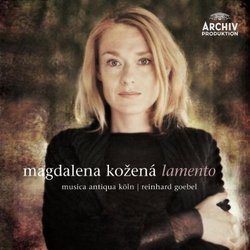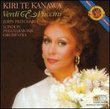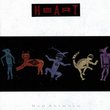| All Artists: Johann Christoph Bach, Francesco Bartolomeo Conti, Johann Sebastian Bach, Carl Philipp Emanuel Bach, Johann Christoph Friedrich Bach, Reinhard Goebel, Musica Antiqua Köln, Magdalena Kozena Title: Lamento Members Wishing: 0 Total Copies: 1 Label: Archiv Produktion Original Release Date: 1/1/2005 Re-Release Date: 8/9/2005 Genres: Pop, Classical Styles: Vocal Pop, Opera & Classical Vocal, Forms & Genres, Concertos, Historical Periods, Baroque (c.1600-1750), Classical (c.1770-1830) Number of Discs: 1 SwapaCD Credits: 1 UPC: 028947419426 |
Search - Johann Christoph Bach, Francesco Bartolomeo Conti, Johann Sebastian Bach :: Lamento
 | Johann Christoph Bach, Francesco Bartolomeo Conti, Johann Sebastian Bach Lamento Genres: Pop, Classical
This is a collection of works by the Bach family--J.S., C.P.E., and J.C.--and includes a transcription by Johann Sebastian of a cantata by the Italian composer Francesco Conti (1682-1732). As the title suggests, these work... more » ![header=[] body=[This CD is available to be requested as disc only.]](/images/attributes/disc.png?v=5b450bfd) ![header=[] body=[This CD is unavailable to be requested with the disc and back insert at this time.]](/images/attributes/greyed_disc_back.png?v=5b450bfd) ![header=[] body=[This CD is available to be requested with the disc and front insert.]](/images/attributes/disc_front.png?v=5b450bfd) ![header=[] body=[This CD is unavailable to be requested with the disc, front and back inserts at this time.]](/images/attributes/greyed_disc_front_back.png?v=5b450bfd) |
Larger Image |
CD DetailsSynopsis
Amazon.com This is a collection of works by the Bach family--J.S., C.P.E., and J.C.--and includes a transcription by Johann Sebastian of a cantata by the Italian composer Francesco Conti (1682-1732). As the title suggests, these works all deal with grief; indeed, the first work, by J.C. Bach (1642-1703), "Ach, dass ich Wassers g'nug hätte," a plea by the singer to shed enough tears to have her sins forgiven, begins with the word "Ach" repeated four times. Kozena fills it with such understated sadness that it's unforgettable. In this work and throughout she sings with a legato that is flawless, tone that always finds the right dynamic for each word, and an ease of emission which makes her presentation of these works seem as natural as speech. The Conti cantata ends with a 90-second "Alleluja" that is ablaze with coloratura, and not a note is out of place; it is a nice contrast with the shadowy, lachrymose nature of the rest of the selections. Kozena's depth of feeling is matched by her ability to express it simply. Along with her colorful sound palette, she and conductor Reinhard Goebel and his Musica Antiqua Köln turn this disc in to a "must-have" for lovers of rare Baroque music and beautiful singing. --Robert Levine Similarly Requested CDs
|
CD ReviewsA Lamento Almost Perfect Akimon Azuki | 09/30/2005 (5 out of 5 stars) "This is a mighty interesting selection of lesser known offerings from the Bach family, plus two better known cantatas by JSBach Sr mixed in. The opening "Ach, Dass Ich Wassers..." by Johann Christoph Bach, with its strange harmonies, reminiscent of Gesualdo's Gagliarda, is a real stunner and Kozena's heartfelt interpretation hits just the right spot. Francesco Bartolomeo Conti's "Languet anima mea", Philipp Emanuel Bach's "Selma" and Johann Christoph Friedrich Bach's "Die Amerikanerin" are great, though not quite as spectacular, by comparison. And overall, from its classy cover photo to outstanding playing of the orchestra- in 415 Hz tuning, BTW- this CD is a great package. However, there is a slight glitch: a bizarre version of JS Bach's Cantata BWV 170. The first movement does not have to be taken at a funereal tempo, even on a disc called Lamento, but why play it at such a breakneck speed? Try and compare it to Andreas Scholl's version on his Alto Cantatas where he offers up that heavenly peace and stillnes. Then, the rushed recitativo in warbly gurgly German, then the super fast last movement... It's one thing to play Bach at quicker pace and play up the dance element of his rhythms- it's another to come up with something that sounds like a drunken barn dance; instead of a Vergnugte Ruh, it's a Verruckte Ruh. I still rather like the whole thing, but it sure is a strange approach to this cantata. If you love Kozena's voice- and it is a voice that could sing a Windows XP programming code and make it sound beautiful- you should get this CD asap: her contralto range and that bright top extension are better than ever, the long lines, the many vocal colours, and great trills, runs and vibrato shadings are just fabulous, especially in this unusual Baroque repertoire. She deserves all the accolades and every "Osobnost roku/Artist of the Year" title coming her way. I really like this Lamento and I find that I enjoy it more and more with repeat listenings. I would suggest checking out the sound samples first to make sure that radical BWV 170 is to your liking, but it's definitely one of the best classical music albums of 2005." Kozena Finds Recording Oeuvre in Early Music Pieces from the Ed Uyeshima | San Francisco, CA USA | 09/20/2005 (4 out of 5 stars) "Although she stumbled a bit on her last recital CD, "Songs" (which covered disparate song cycles from the first half of the 20th century), Czech mezzo-soprano Magdalena Kozena seems a stronger match for this early music program devoted almost exclusively to members of the Bach family. With her powerfully sculpted voice, she is a masterful interpreter of Baroque music especially as she lights into her higher soprano range. Kozena opens most vibrantly with her opening lament, Johann Christoph Bach's "Ach, dass ich Wassers g'nug hatte", which puts voice to a sinner's guilt. There is a striking series of cantatas, "Languet anima mea", by Viennese court composer Francesco Bartolomeo Conti (not a relative but someone who apparently held favor with Johann Sebastian Bach), which closes with a stirring coloratura run of "Alleluja". The centerpiece - and certainly the most accomplished piece here - is by the master himself, J.S. Bach's "Vergnuegte Ruh, beliebte Seelenlust" which showcases Kozena's dramatic acumen and luminous tone. He also contributes a lighter aria which is actually a song of praise upon seeing the baby Jesus, "Bekennen will ich seinen Namen", that makes fine use of two interweaving violins. Carl Philipp Emanuel Bach's "Selma" brings out her expressive range in an affecting manner though the aria is quite brief. Johann Christoph Friedrich Bach's "Die Amerikanerin" seems a bit anticlimactic, as it doesn't have the compelling drama of his father J.S. Bach's work, but Kozena lends intelligence and agility to her fiery interpretation here. Music director Reinhard Goebel provides expert guidance to the period-authentic ensemble Musica Antiqua Koln. I particularly liked the flute solos played with amazing dexterity by Verena Fischer and Dorothea Seel. This is a triumphant recording for the gifted Kozena, who has heretofore had an erratic track record on disc." Fascinating Lamento Stella E. | 10/29/2005 (5 out of 5 stars) "Even though this album is called Lamento, it's not at all gloomy, and it is certainly a great vehicle for Kozena's radiant voice.
She excels on the technical level, and sings in impeccable Baroque style, but she is also very dramatically engaged and she makes these unfamiliar compositions come to life. She takes risks, both in the choice of these compositions, and stylistic choices: I like the jaunty version of Cantata BWM 170, though it is very different from what we are used to. I also like the way this album is programmed, forming a certain meditative story of sin and redemption. I think this is Kozena's most interesting recital to date, and I am very glad I discovered this album. It's not just her singing that is brilliant, the orchestra playing is spectacular, too. Don't hesitate to give this Lamento a try, especially if you love beautifully performed, fresh sounding Baroque music." |

 Track Listings (17) - Disc #1
Track Listings (17) - Disc #1







